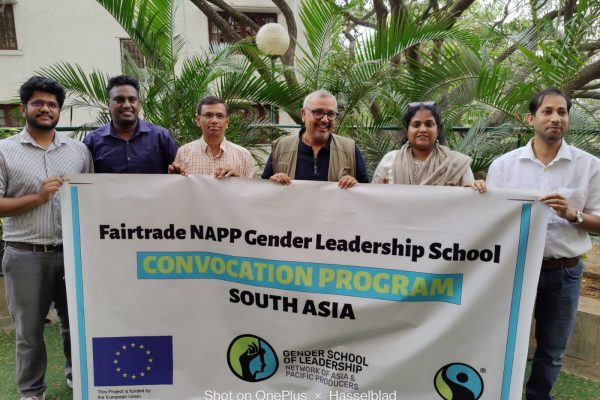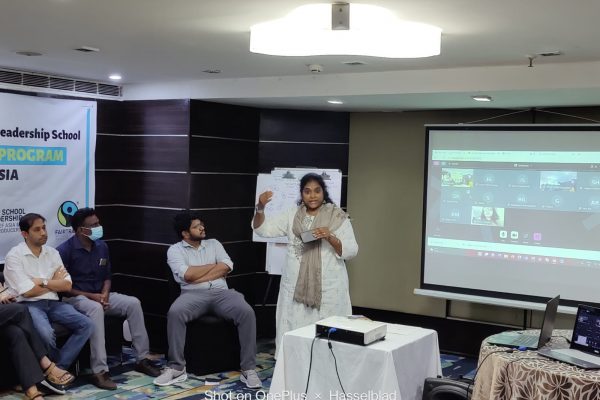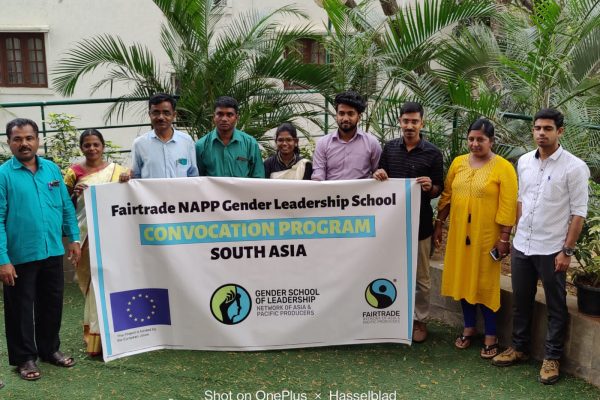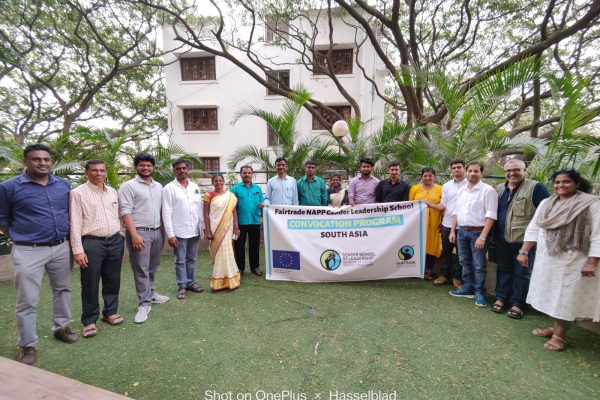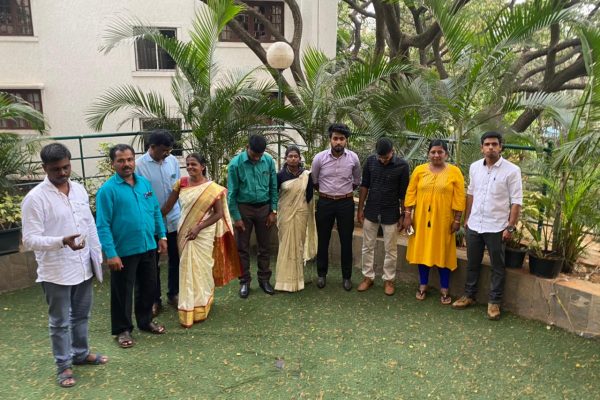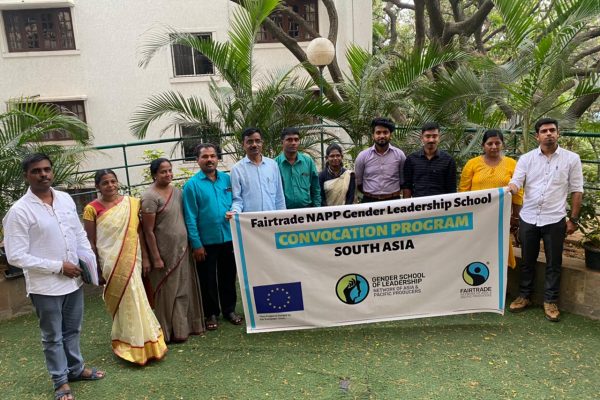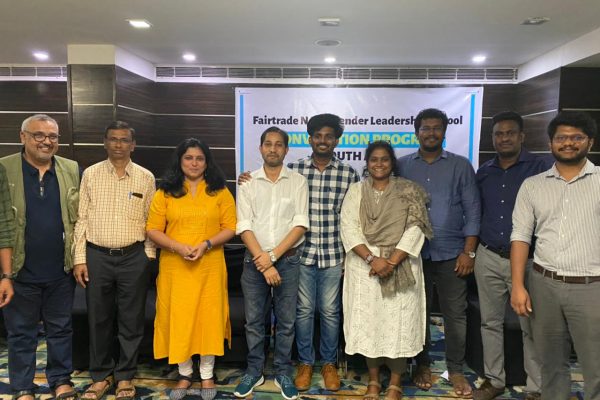The Fairtrade NAPP Gender Leadership School- the first flagship program of NAPP has successfully completed its 03 phases of training and convocation program in all the 03 regions of Asia and Pacific ( Central, Southeast, and South Asia).
After the convocation of Central Asia and Southeast Asia in 2021, 15 participants from Sri Lanka and India ( 12 physical, 03 virtual) came together for a refresher training and to complete their GLS Mini project proposals under the leadership school. They successfully completed their 3rd phase which was delayed since 2020 due to the COVID-19 lockdown. The program was funded by the European Union!
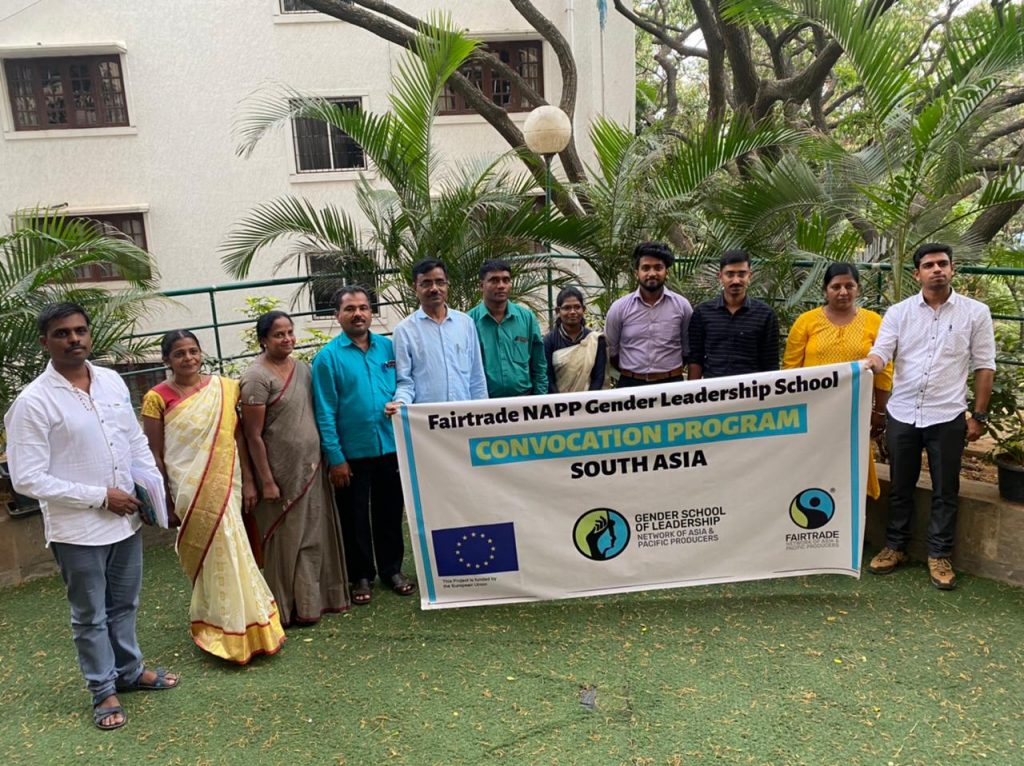
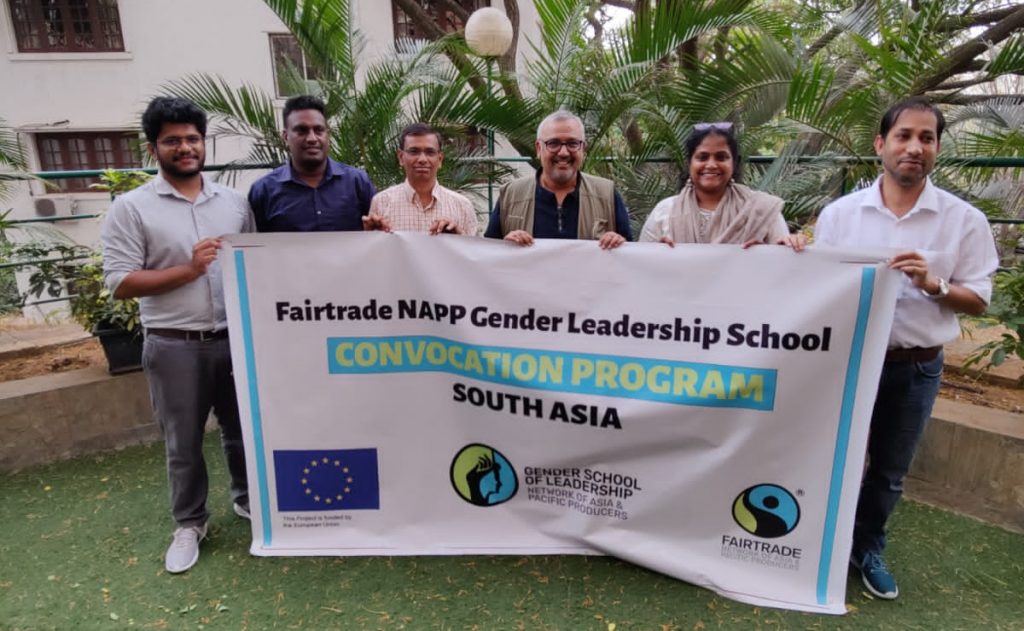
The 1st day of the training began with the introduction of the participants and their briefing on the work they had accomplished among young women and youth after the first two phases of the Gender Leadership School. The introduction was followed by a refresher training on Human and Gender rights from the first module. The participants referred to 30 excerpts from various newspapers and explained their own understanding of the articles.
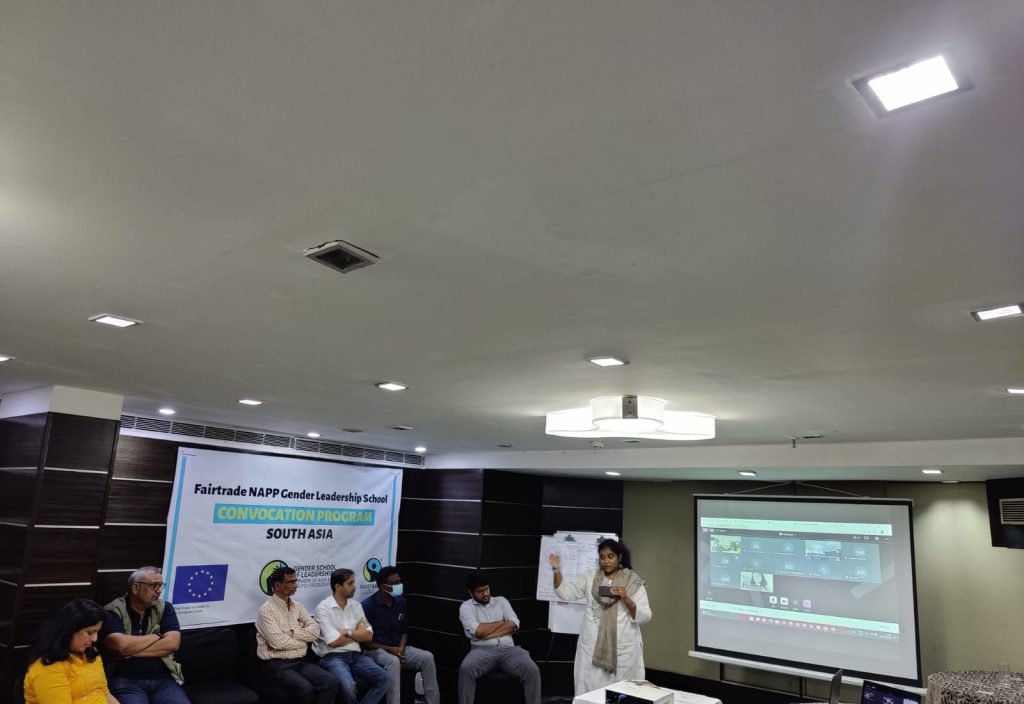
There were afternoon discussions on the Fairtrade Gender Strategy and the goals of empowering women and young girls in Fairtrade. The participants felt that when women become leaders, they have better negotiation terms, both for themselves and for their families which in turn can bring a transformative approach to gender mainstreaming in the Fairtrade system.
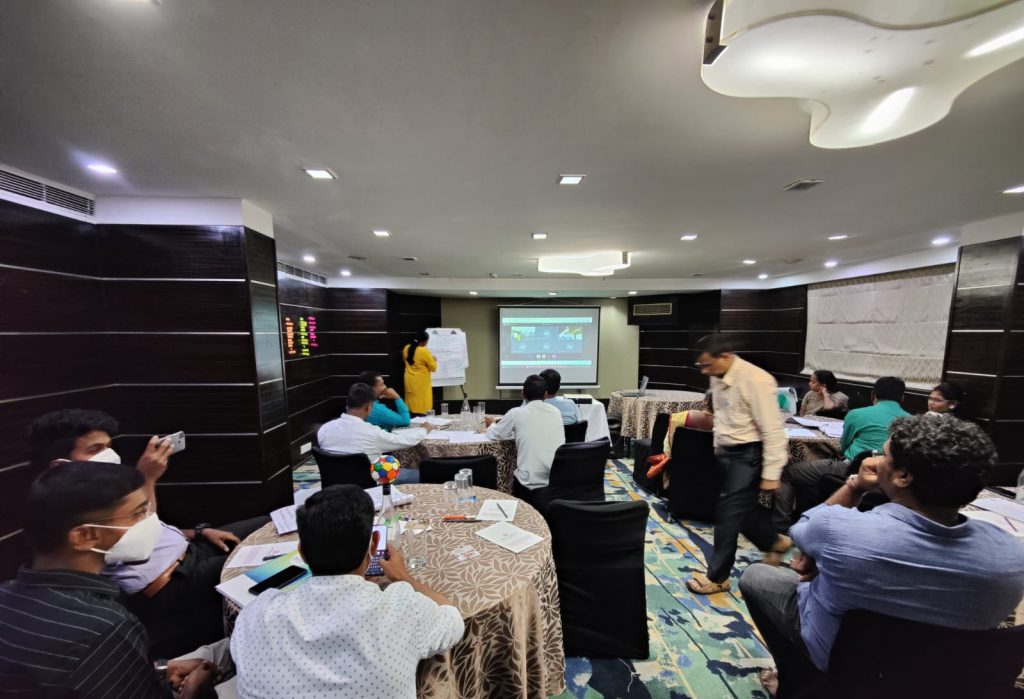 The participants also shared their experiences on how they were able to recognize ‘equality’ in their own families and workplace and in the process have learned that when women are given opportunities, they prosper and take care of their families. With better mobility, they also have access to markets and learn to negotiate.
The participants also shared their experiences on how they were able to recognize ‘equality’ in their own families and workplace and in the process have learned that when women are given opportunities, they prosper and take care of their families. With better mobility, they also have access to markets and learn to negotiate.
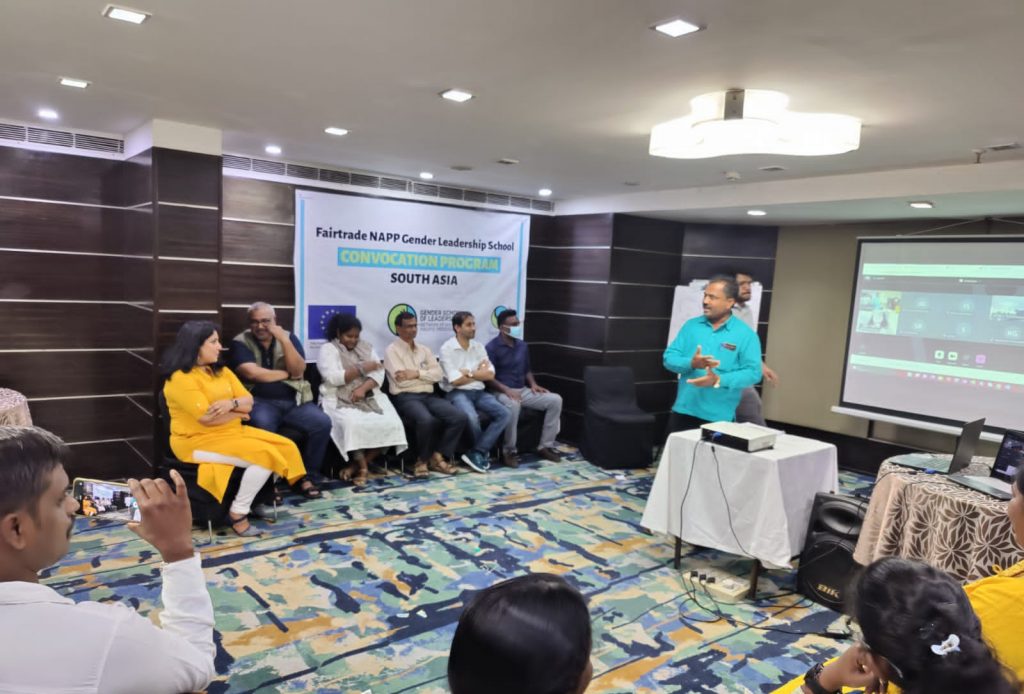 The second day was filled with refresher training on digital and financial literacy. The participants identified various sources of money such as loans from SHG groups and banks, Fairtrade premiums, other schemes, etc., and discussed ways to make the money grow through profitable means. They spoke about recurring and non-recurring expenditure and stepwise planning of income generation and sustainability.
The second day was filled with refresher training on digital and financial literacy. The participants identified various sources of money such as loans from SHG groups and banks, Fairtrade premiums, other schemes, etc., and discussed ways to make the money grow through profitable means. They spoke about recurring and non-recurring expenditure and stepwise planning of income generation and sustainability.
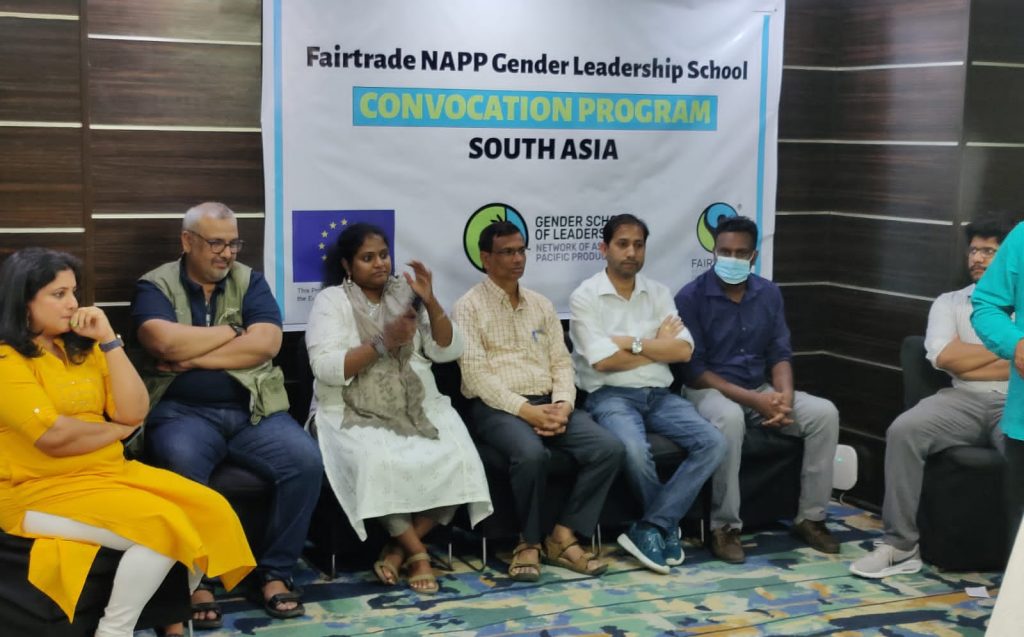
Post lunch the participants prepared their proposal for the Small Entrepreneurships Projects (GLS Mini Projects) with a budget of 1000 Euros.
On the 3rd day, all the participants presented their proposals to the evaluation team which was followed by a final convocation program led by Sheena Susan Varghese, President of High range Organic Fairtrade Farmers Association. The participants during their sharing spoke about the various ways in which the program was beneficial to them.
“The training was beneficial in building my capacities as a leader, and my exposure to strong women like Sonia Dominica from Fairtrade NAPP, has helped me to build a strong personality,” said Dharshani Raja Manikkam; Gender Leadership School Participant
” GLS South Asia Convocation was one of the successful events for the participants who could manage to complete the 3 modules with sheer intensity and focus. Despite multiple challenges such as COVID restrictions, and delay in organizing the meetings, the efforts shown by the participants during the final phase of GLS was commendable. Altogether 13 members completed their GLS journey through participation and learning, resulting in an opportunity of creating their own ventures in the future. The skill acquired by them through the training was evident and they did go with additional confidence to take this mission forward of gender leadership. The last phase of the GLS is to set up the enterprise they dreamt of during the Convocation day and I sincerely wish them all the best to fulfill the same. NAPP would be happy to be a facilitator till they reach their goals.” Amit Das; Program Consultant – India
Fairtrade NAPP Gender Leadership School- Small Entrepreneurships Projects
(GLS Mini Projects)
To support the participants to take on Leadership and Management roles in their communities, organizations, and households, Small Entrepreneurships Projects (GLS Mini Projects) will be supported through the GLS Platform.
India:
- Implementation of Vetiver Handicrafts Project Unit by Sahyadri Organic Small Farmers Consortium- FLO ID 20381; Kerala
Two participants from the Cooperative already have prior experience in handicrafts making it easier for them to understand the cost and sustainability of this project. Vetiver is a grass-like shot that takes about 6 months to harvest and process, the grass is dried and made into little baskets that can be used to pack organic spices. The project is being implemented with groups of men and women, who will organize themselves for the sustainability of this mini entrepreneurship.
- Value Addition in Fruits and Vegetables by High range Organic Fairtrade Farmers Association-FLO ID 39059; Kerala
The cooperative farmer members have project areas covering multi-crops. Through the project, the cooperative can collect seasonal fruits and vegetables from farmers of the Idduki region and process them into raw materials thereby creating a source of additional income for the farmers.
- Jack Fruit Processing by Manarcadu Social Service Society (MASS) -FLO ID 19619, Karnataka as an additional source of income for farmers.
Since Jack fruit is found in abundance in Kerala, the cooperative will help to collect the jack fruit from farmers of Idukki and nearby areas for value addition and for generating additional income for their farmer members.
- Home-based food Products by Aravatagi Primary Agriculture Credit Co-operative Sangha Niyamit, Doori, Karnataka – FLO ID 27788
In the initial stage, the team had been running a pickling project in a very limited way. Later they came up with preparing other homemade products which are in demand in the area. The team also spelled out ways to sustain the program.
- Roti Making Project by Primary Agriculture Credit Co-operative Sangha Niyamit, Itagi, Karnataka FLO ID 2779
The cooperative came up with a project to make Rotis ( Indian bread) with Jowar, which is also a staple food in the area of North Karnataka. These rotis are in great demand in North Karnataka for weddings and other festivities.
Sri Lanka
Sri Lanka, currently facing deep financial constraints because of Covid 19, proposed projects to improve the financial status and the nutritional requirement of women and children.
- Self-help Home Gardening project by Stockholm Estate of Horona Plantations PLC- FLO ID 18010
A mini-income-generating plan was put forth by the estate to work with groups of women who have small plots of land near their houses and grow common vegetables found in the area. The estate would like to support them systematically in growing and creating a market for their products and to help women barter their products between themselves.
- Mushroom cultivation Project by Abbotsliegh Estate of Hatton Plantations PLC- FLO ID 18792.
Mushroom cultivation is seen as a profitable and productive business in many countries as it helps to convert the farmer’s hard work into profit. The Project aims at financial empowerment of the families involved.
- Organically grown turmeric, ginger, and passion fruits by Stassen Natural Foods (Pvt.) Ltd. (Idulgashina Bio Tea Garden)- FLO ID 1550
The gender leader of Idulgashina Bio Tea Garden proposed a project to grow passion fruit, ginger, and turmeric and to market it to their existing customers.
- Income Generation for SPO Farmers via Food Preservation Project by Small Organic Growers Association (SOFA)- FLO ID 558
Through the Food preservation project, SOGA aims to address the food scarcity among the vulnerable population of Sri Lanka. All the projects are group enterprises, with the intention of income generation which also looks at the nutrition of the target population.


